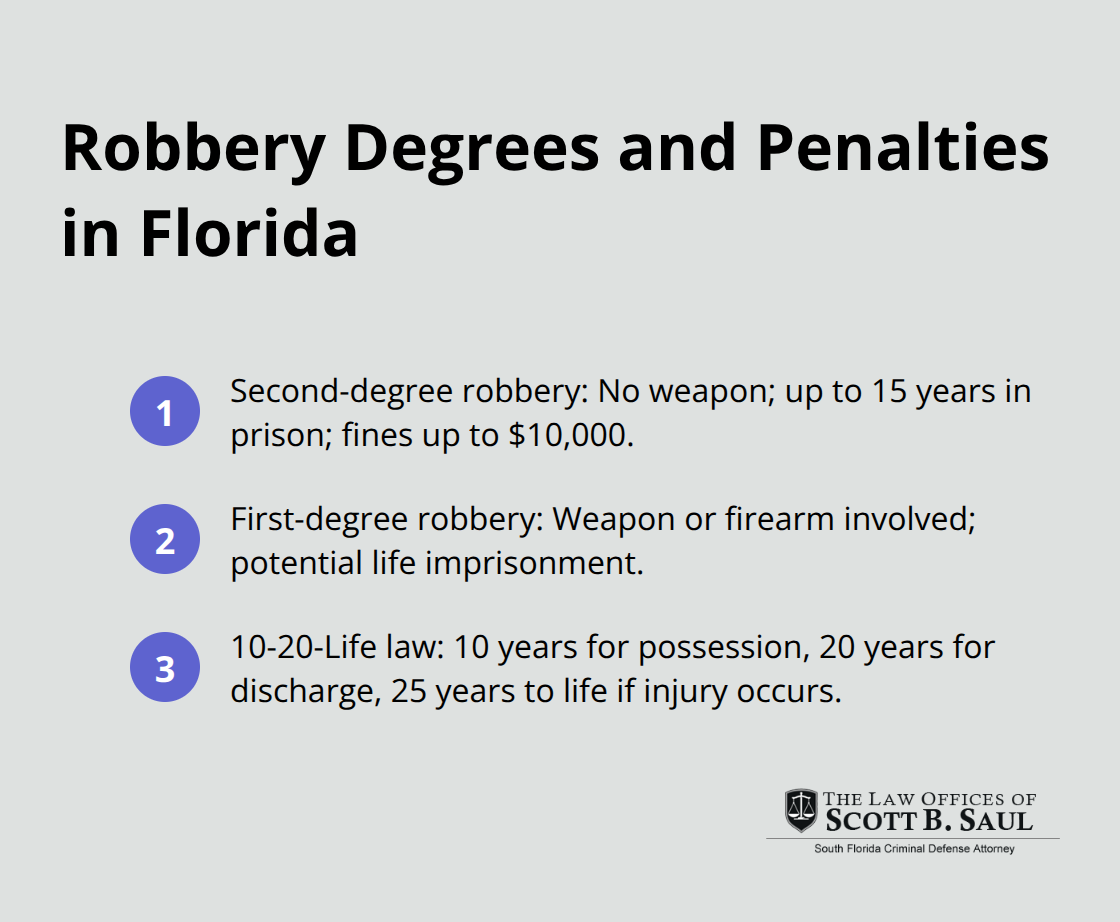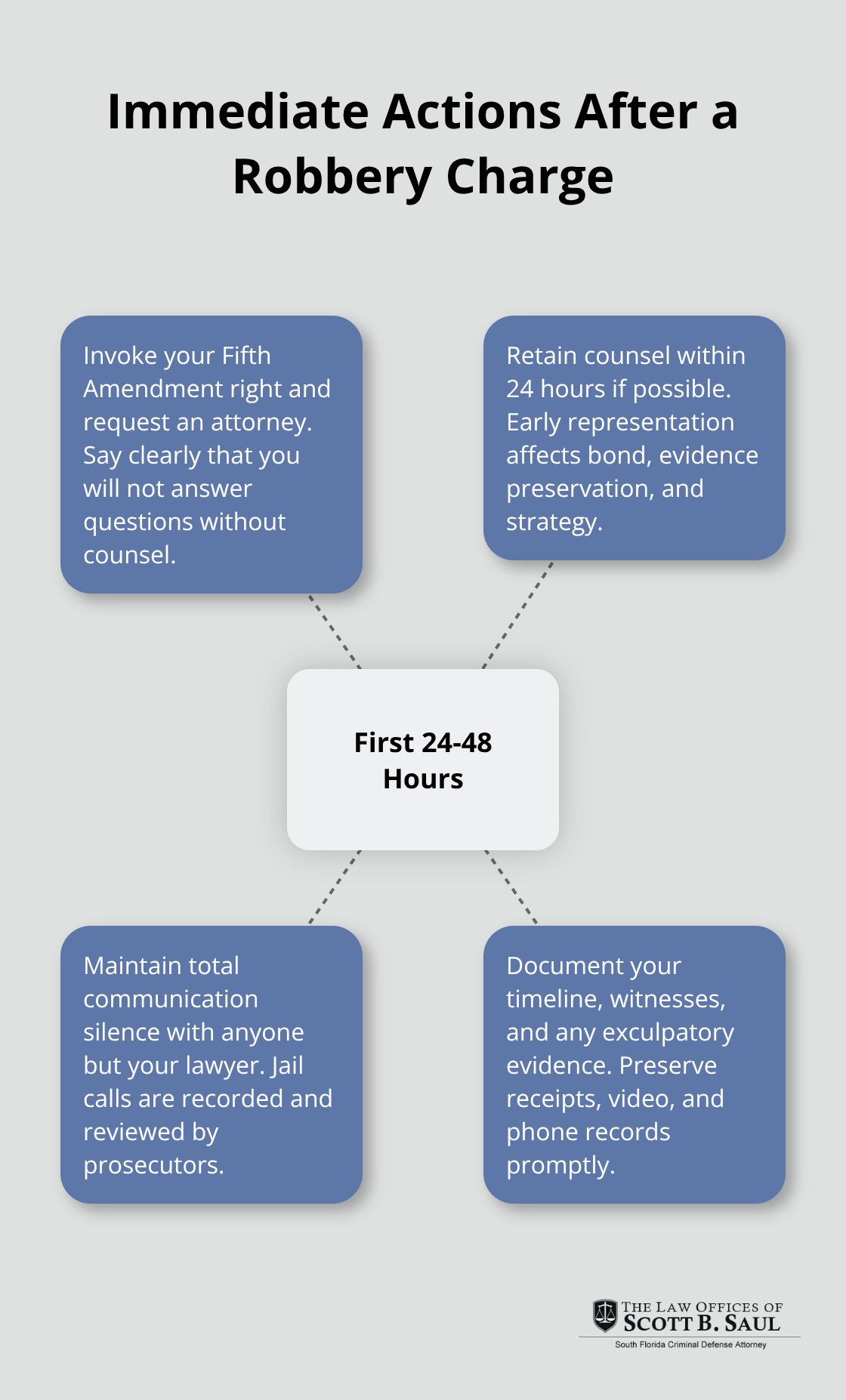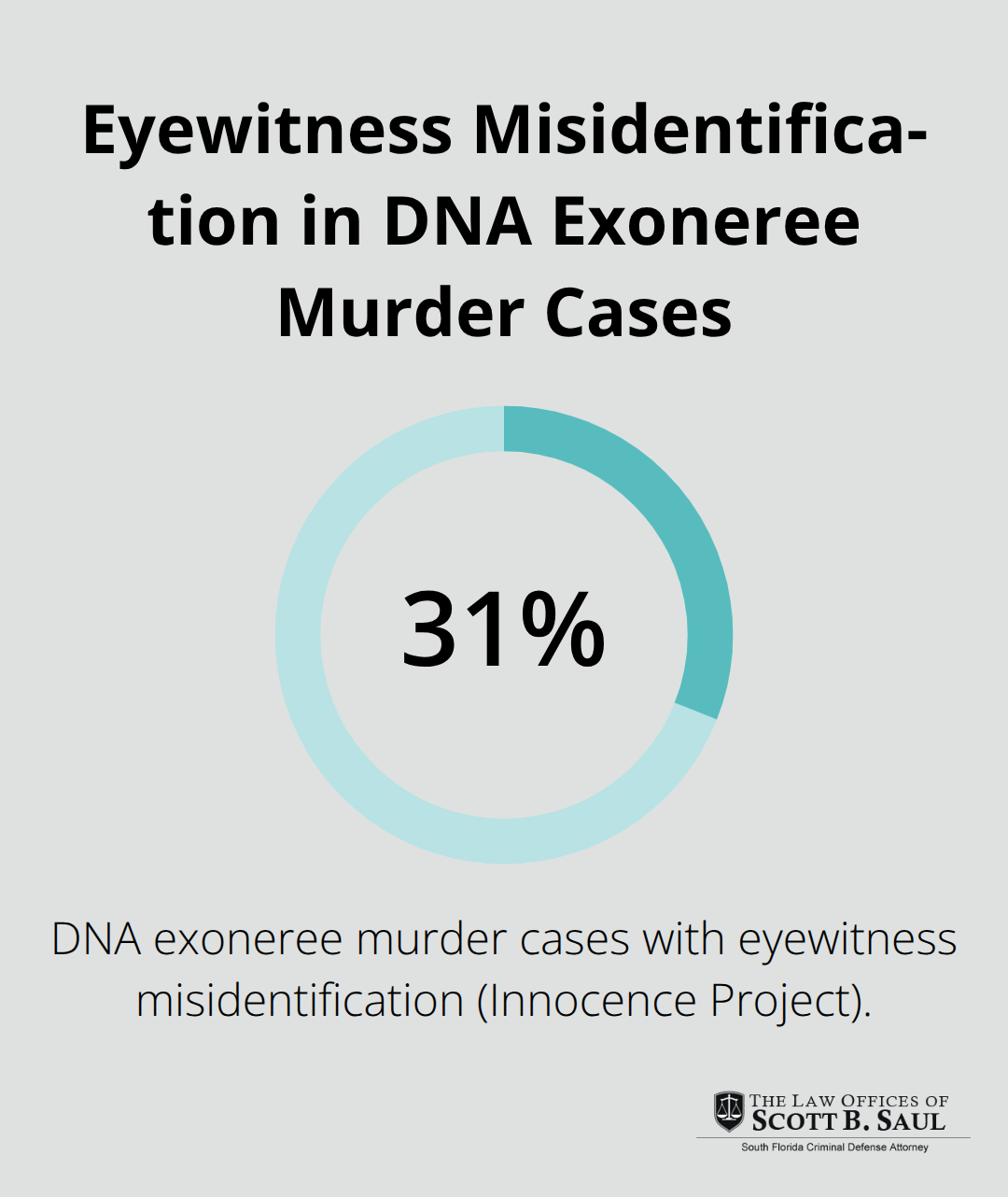What to Do if You’re Facing Robbery Charges in Florida
By : saulcrim | Category : Criminal Defense | Comments Off on What to Do if You’re Facing Robbery Charges in Florida
24th Nov 2025

Robbery charges in Florida carry severe penalties that can change your life forever. The state prosecutes these cases aggressively, with convictions often resulting in lengthy prison sentences.
We at Law Offices of Scott B. Saul understand the fear and confusion you’re experiencing right now. Taking the right steps immediately after being charged can make the difference between freedom and years behind bars.
What Exactly Constitutes Robbery in Florida
The Legal Elements That Define Robbery
Florida Statute 812.13 defines robbery as taking money or property from another person through force, violence, assault, or fear. The prosecution must prove three specific elements beyond a reasonable doubt: you took property that belonged to someone else, you used force or threatened force during the act, and you intended to permanently deprive the owner of their property. The force element separates robbery from simple theft – even minimal physical contact or verbal threats can elevate a theft charge to robbery. Florida courts have ruled that snatching a purse from someone’s hands constitutes sufficient force for a robbery conviction.
Robbery Classifications and Their Penalties
Florida law recognizes two degrees of robbery with dramatically different penalties. Second-degree robbery occurs when no weapon is involved and carries up to 15 years in prison plus fines up to $10,000. First-degree robbery involves the use or possession of a firearm, deadly weapon, or weapon during the crime and can result in life imprisonment.

Armed robbery with a firearm triggers Florida’s 10-20-Life law, which mandates minimum sentences of 10 years for possession, 20 years for discharge, and 25 years to life if someone suffers injury. Strong-arm robbery, carjacking, and home invasion robbery fall under these classifications based on circumstances and location.
Key Differences From Theft and Burglary
Robbery requires direct confrontation with a victim and the use of force, while theft involves the act of taking property without force or threats. Burglary focuses on unlawful entry into a structure with intent to commit a crime inside (regardless of whether property is actually taken). The timing matters significantly – if you enter a building with intent to steal and then encounter someone, the use of force transforms the crime from burglary to robbery. These distinctions affect your defense strategy and potential penalties, which makes accurate charge identification vital for your case.
Now that you understand the specific elements that define robbery charges, the next step involves taking immediate action to protect your rights and build your defense.
What Should You Do Right After Being Charged
Invoke Your Constitutional Rights Immediately
The moment law enforcement approaches you about robbery charges, invoke your Fifth Amendment right to remain silent. Tell officers clearly: “I am invoking my right to remain silent and want to speak with an attorney.” Many criminal cases involve self-incriminating statements made during initial questioning.
Law enforcement officers receive extensive training in interrogation techniques designed to extract admissions. They can legally lie about evidence during questioning. Even innocent explanations can be twisted and used against you in court. Your silence cannot be used as evidence of guilt, but your words absolutely can and will be used to convict you.
Secure Legal Representation Within Hours
Contact a criminal defense attorney within the first 24 hours of your arrest – this timing directly impacts your case outcome. Florida’s criminal justice system moves quickly, and your first appearance typically occurs within 24 hours, where bond decisions are made.
An attorney can immediately begin to investigate your case, preserve evidence, and interview witnesses before memories fade or evidence disappears. Public defenders in Florida handle substantial caseloads according to state judicial reports, while private attorneys typically manage fewer cases, allowing for more focused attention on your defense.
Maintain Complete Communication Silence
Never discuss your case details with family members, friends, or other inmates during jail calls or visits. Florida correctional facilities record all phone conversations except those with your attorney, and prosecutors routinely review these recordings for incriminating statements.

Social media posts from you or your associates can also become evidence – delete nothing but post nothing new about your situation. Even seemingly supportive comments from friends can backfire if they inadvertently reveal details about your whereabouts or activities on the day of the alleged crime.
Prepare for Your Defense Strategy
Document everything you remember about the incident while details remain fresh in your memory. Write down the names of potential witnesses, your exact location before and after the alleged crime, and any evidence that might support your innocence (such as receipts, video footage, or phone records).
Your attorney will need this information to build the strongest possible defense. The prosecution will already be working to build their case against you, so time becomes a critical factor in developing effective defense strategies that can challenge their evidence and protect your freedom.
How Can You Build a Strong Defense Against Robbery Charges
Attack Prosecution Evidence and Witness Accounts
Defense attorneys focus on exposing weaknesses in the prosecution’s evidence rather than proving innocence. Florida courts require proof beyond reasonable doubt, and skilled lawyers systematically challenge every piece of evidence. Video surveillance often provides poor image quality or incomplete coverage, which makes positive identification questionable. Eyewitness testimony proves notoriously unreliable – the Innocence Project reports that eyewitness misidentification was involved in 31% of murder cases among DNA exonerees.

Your attorney will examine lighting conditions, distance, stress levels, and cross-racial identification factors that affect witness accuracy. Physical evidence like fingerprints or DNA requires proper chain of custody documentation. Improper collection or storage can render evidence inadmissible in court.
Establish Lack of Intent and Identity Defenses
Intent represents a critical element in robbery cases – prosecutors must prove you specifically intended to permanently deprive someone of their property through force. Many situations involve misunderstandings or disputes over property ownership that prosecutors wrongly characterize as robbery.
Alibi evidence becomes particularly powerful when concrete documentation supports it (timestamped receipts, security footage from other locations, or cell phone GPS data). Florida courts have dismissed robbery charges when defendants demonstrated they were miles away during the alleged crime. Mistaken identity defenses work best when combined with evidence showing the actual perpetrator’s different physical characteristics, clothing, or behavior patterns that witnesses observed.
Navigate Strategic Plea Negotiations and Sentencing Alternatives
Florida’s mandatory minimum sentences for armed robbery make plea negotiations extremely valuable for avoiding life sentences. Prosecutors often overcharge initially, knowing they can negotiate down to lesser offenses like theft or assault. Your attorney might negotiate robbery charges down to theft, which carries significantly lower penalties and avoids the violent crime designation that affects future sentences.
Drug court, mental health court, or pretrial diversion programs offer alternatives for defendants with underlying issues that contribute to their charges. These programs allow case dismissal upon successful completion (avoiding permanent criminal records that destroy employment and housing opportunities). Successful outcomes in complex cases demonstrate how experienced defense attorneys can achieve favorable results even when facing serious charges.
Final Thoughts
Robbery charges in Florida demand immediate action to protect your future. Every hour you delay contacting an attorney reduces your chances of building an effective defense. The prosecution begins work against you from the moment they file charges, gathering evidence and interviewing witnesses while you remain vulnerable.
An experienced criminal defense attorney provides access to investigative resources, expert witnesses, and negotiation skills that can mean the difference between conviction and freedom. A skilled lawyer understands Florida’s complex robbery statutes and knows how to challenge evidence, question witness reliability, and identify procedural violations that could lead to case dismissal. We at Law Offices of Scott B. Saul have successfully defended clients against serious criminal charges (including robbery cases) throughout our years of practice.
Don’t face these serious charges alone. Contact Law Offices of Scott B. Saul today for a comprehensive consultation about your robbery case. Our team will review your situation and develop a defense strategy tailored to your specific circumstances.
Archives
- November 2025 (7)
- October 2025 (8)
- September 2025 (9)
- August 2025 (8)
- July 2025 (8)
- June 2025 (9)
- May 2025 (9)
- April 2025 (8)
- March 2025 (9)
- February 2025 (8)
- January 2025 (9)
- December 2024 (10)
- November 2024 (5)
- July 2024 (2)
- June 2024 (2)
- May 2024 (2)
- April 2024 (2)
- March 2024 (2)
- February 2024 (2)
- January 2024 (2)
- December 2023 (2)
- November 2023 (2)
- October 2023 (2)
- September 2023 (2)
- August 2023 (1)
- July 2023 (2)
- June 2023 (2)
- May 2023 (2)
- April 2023 (2)
- March 2023 (2)
- February 2023 (2)
- January 2023 (2)
- December 2022 (2)
- November 2022 (2)
- October 2022 (2)
- September 2022 (2)
- August 2022 (2)
- July 2022 (2)
- June 2022 (2)
- May 2022 (2)
- April 2022 (2)
- March 2022 (2)
- February 2022 (2)
- January 2022 (2)
- December 2021 (2)
- November 2021 (2)
- October 2021 (2)
- September 2021 (2)
- August 2021 (2)
- July 2021 (2)
- June 2021 (2)
- May 2021 (2)
- April 2021 (2)
- September 2020 (5)
- July 2020 (4)
- June 2020 (4)
- May 2020 (4)
- April 2020 (5)
- March 2020 (4)
- February 2020 (4)
- January 2020 (4)
- December 2019 (1)
- November 2019 (4)
- October 2019 (4)
- September 2019 (4)
- August 2019 (4)
- July 2019 (5)
- June 2019 (4)
- May 2019 (4)
- April 2019 (4)
- March 2019 (4)
- February 2019 (4)
- January 2019 (4)
- December 2018 (4)
- November 2018 (5)
- October 2018 (5)
- September 2018 (4)
- August 2018 (4)
- July 2018 (7)
- June 2018 (4)
- May 2018 (4)
- April 2018 (8)
- March 2018 (4)
- February 2018 (4)
- January 2018 (4)
- November 2017 (4)
- October 2017 (4)
- September 2017 (4)
- August 2017 (7)
- July 2017 (6)
- June 2017 (4)
- May 2017 (4)
- April 2017 (4)
- March 2017 (4)
- February 2017 (7)
- January 2017 (4)
- December 2016 (7)
- November 2016 (4)
- October 2016 (4)
- September 2016 (10)
- August 2016 (4)
- July 2016 (4)
- June 2016 (4)
- May 2016 (4)
- April 2016 (4)
- March 2016 (4)
- February 2016 (7)
- January 2016 (4)
- December 2015 (5)
- November 2015 (4)
- October 2015 (7)
- September 2015 (4)
- August 2015 (4)
- July 2015 (13)
- June 2015 (9)
- May 2015 (8)
- April 2015 (6)
- March 2015 (4)
- February 2015 (4)
- January 2015 (4)
- December 2014 (4)
- November 2014 (4)
- October 2014 (4)
- September 2014 (3)
Categories
- Adjudication (1)
- Bankruptcy (1)
- Burglary Crimes (3)
- calendar call (1)
- Car Accident (1)
- Criminal Defense (371)
- Cyber Crimes (7)
- DNA (1)
- Domestic Violence (9)
- Drug Crimes (5)
- DUI (12)
- Embezzlement (1)
- Environmental Crimes (4)
- Expungement Law (2)
- Federal Sentencing Law (3)
- Firearm (3)
- Forgery (4)
- General (82)
- Healthcare (3)
- Immigration (1)
- Indentity Theft (1)
- Insurance (5)
- judicial sounding (2)
- Juvenile Crimes (4)
- Manslaughter (4)
- Money Laundering (3)
- Organized Crime (1)
- Racketeering (1)
- Reckless Driving (3)
- RICO (3)
- Sealing and Expunging (2)
- Sex Offense (1)
- Shoplifting (1)
- Suspended Driver's License (1)
- Traffic (4)
- Trending Topics (1)
- White-collar Offenses (1)

